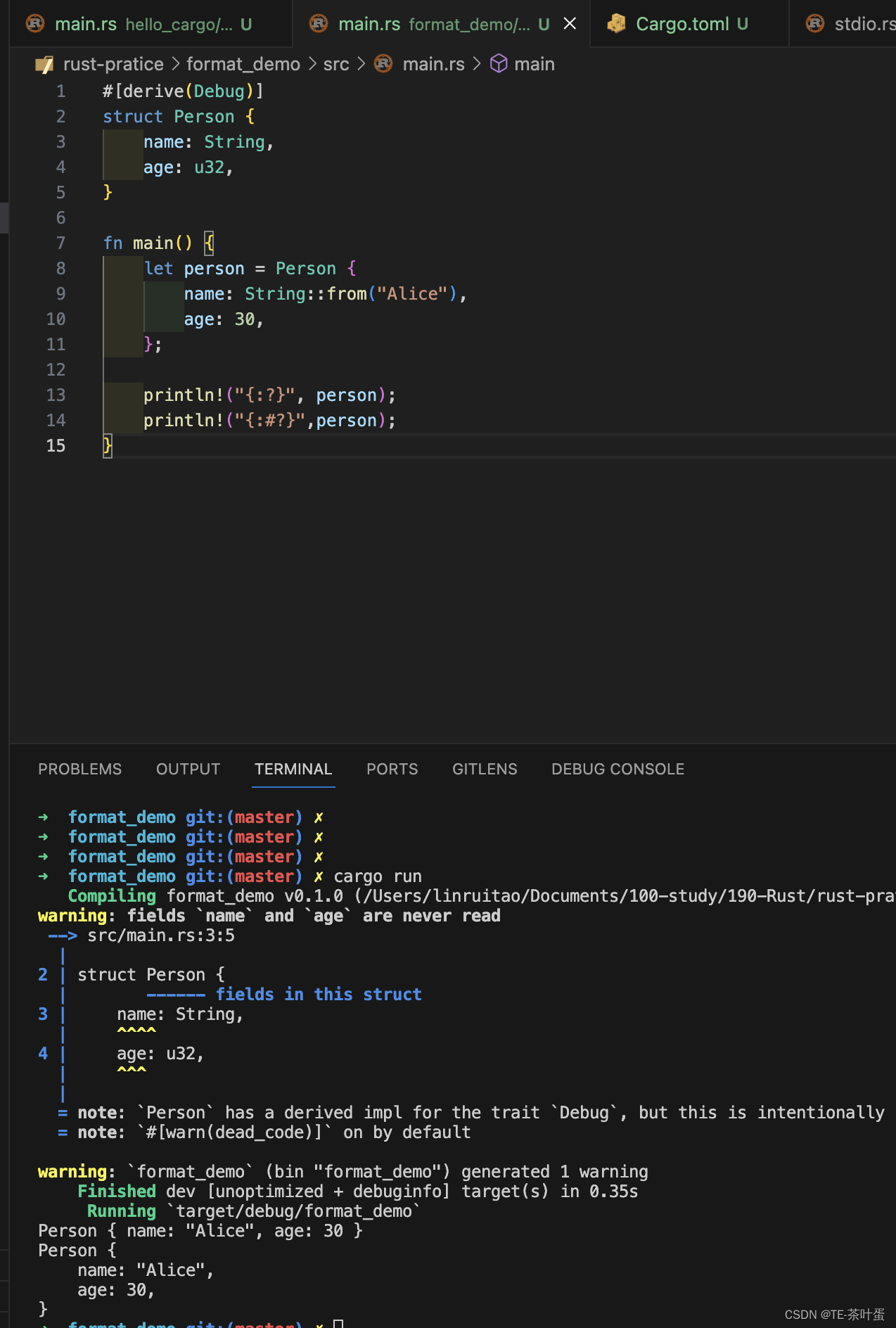本文介绍: 一个优秀的项目,错误处理的优雅性是至关重要的,而rust,anyhow creat是绕不过去的一个,今天我们来研究下,怎么使用它,帮助我们写出更优雅的代码。转换为其包含的具体错误类型的引用。这可以用于检查和处理特定类型的错误。中最重要的结构体,它是动态错误类型的包装器,能从所有实现了。类型的值,它可以接受字符串,格式化字符串作为参数,或者实现。,但是仅仅打印最外层错误或者上下文,而不是内层的错误;是可用的,就是底层的错误类型没有提供;的错误转换而来,也能转换成。要求包裹的错误必须是。打印外层和底层错误;
一个优秀的项目,错误处理的优雅性是至关重要的,而rust,anyhow creat是绕不过去的一个,今天我们来研究下,怎么使用它,帮助我们写出更优雅的代码
关注 vx golang技术实验室,获取更多golang、rust好文
Part1一、anyhow
anyhow::Error 是这个 crate 中最重要的结构体,它是动态错误类型的包装器,能从所有实现了 std::error::Error + Send + Sync + 'static 的错误转换而来,也能转换成 Box,它有以下特点:
-
anyhow::Error要求包裹的错误必须是
Send + Sync + 'static;
-
anyhow::Error保证
backtrace是可用的,就是底层的错误类型没有提供;
-
anyhow::Error在内存中只占一个机器字而不是两个;
11.1 打印anyhow方式
-
可以使用
{}或者
.to_string(),但是仅仅打印最外层错误或者上下文,而不是内层的错误;
-
可以使用
{:#}打印外层和底层错误;
-
可以使用
{:?}在调试模式打印错误以及调用栈;
-
可以使用
{:#?}以结构体样式打印错误,例如:
Error {
context: "Failed to read instrs from ./path/to/instrs.json",
source: Os {
code: 2,
kind: NotFound,
message: "No such file or directory",
},
}
21.2 downcast_ref
anyhow 提供了 downcast_ref 方法,用于在运行时将 anyhow::Error 转换为其包含的具体错误类型的引用。这可以用于检查和处理特定类型的错误。
use anyhow::{anyhow,Error};
use thiserror::Error;
#[derive(Error, Debug)]
pub enum MyError {
#[error("the data for key `{0}` is not available")]
Redaction(String)
}
pub fn anyhow_use(){
let error: Error = anyhow!(MyError::Redaction("keys".to_string()));
if let Some(my_error) = error.downcast_ref::<MyError>() {
println!("MyError is parse ok: {}", my_error);
// Handle MyError specifically
} else {
println!("Unknown error: {:?}", error);
// Handle other types of errors
}
}
MyError is parse ok: the data for key `keys` is not available
31.3 anyhow!
使用 anyhow! 这个宏可以生成 anyhow::Error类型的值,它可以接受字符串,格式化字符串作为参数,或者实现 std::error:Error 的错误作为参数。
use anyhow::{anyhow,Error,Result};
fn anyhow()->Result<()>{
return Err(anyhow!("this is return error"))
}
pub fn anyhow_use(){
let err = anyhow();
println!("{:#?}",err)
}
Err(
"this is return error",
)
41.4 anyhow配合thiserror使用
use anyhow::{anyhow, Error, Result};
use thiserror::Error;
#[derive(Error, Debug)]
pub enum DataStoreError {
#[error("the data for key `{0}` is not available")]
Redaction(String),
}
fn bar() -> std::result::Result<(), DataStoreError> {
Err(DataStoreError::Redaction(
"bar() std::result::Result".to_string(),
))
}
fn foo() -> anyhow::Result<()> {
let a = bar()?;
Ok(())
}
fn foo2() -> anyhow::Result<()> {
Err(anyhow::Error::from(DataStoreError::Redaction(
"foo2 (anyhow::Error::from(DataStoreError::Redaction ".to_string(),
)))
}
fn foo3() -> anyhow::Result<()> {
Err(anyhow!(DataStoreError::Redaction(
"foo3 anyhow!(DataStoreError::Redaction".to_string()
)))
}
fn foo4() -> anyhow::Result<()> {
Err(anyhow!("foo4 anyhow! {}", "f4"))
}
pub fn anyhow_use() {
// let err = anyhow();
// println!("{:#?}",err)
let f = foo();
println!("foo {:?}", f);
let f1 = foo2();
println!("foo2 {:?}",f1);
let f2 = foo3();
println!("foo3 {:?}",f2);
let f3 = foo4();
println!("foo4 {:?}",f3);
}
foo Err(the data for key `bar() std::result::Result` is not available)
foo2 Err(the data for key `foo2 (anyhow::Error::from(DataStoreError::Redaction ` is not available)
foo3 Err(the data for key `foo3 anyhow!(DataStoreError::Redaction` is not available)
foo4 Err(foo4 anyhow! f4)
51.5 bail!
anyhow::bail 宏用于提前错误返回,它等价于 return Err(anyhow!($args...)),包含这个宏的函数的返回值必须是 Result<_,anyhow::Error>:
use anyhow::{anyhow,bail, Error, Result};
use futures::future::err;
use thiserror::Error;
#[derive(Error, Debug)]
pub enum DataStoreError {
#[error("the data for key `{0}` is not available")]
Redaction(String),
}
fn bail(i:i16)->anyhow::Result<()>{
if i < 16{
bail!(DataStoreError::Redaction(i.to_string() + &" is less 16".to_string()))
}
Ok(())
}
直接返回
bail! error Err(the data for key `1 is less 16` is not available)
61.6 anyhow::Context
anyhow::Context 为 anyhow::Result 类型提供了 context 方法,能在错误发生时提供更多的上下文信息:
use anyhow::{anyhow, bail, Context, Error, Result};
use futures::future::err;
use std::fs;
use std::path::PathBuf;
use thiserror::Error;
pub struct ImportantThing {
path: PathBuf,
}
impl ImportantThing {
pub fn detach(&mut self) -> Result<()> {
Err(anyhow!("detach failed"))
}
}
pub fn do_it(mut it: &mut ImportantThing) -> Result<Vec<u8>> {
it.detach()
.context("Failed to detach the important thing")?;
let path = &it.path;
let context =
fs::read(path).with_context(|| format!("Failed to read in str form {}", path.display()))?;
Ok(context)
}
pub fn do_it1(it: &mut ImportantThing) -> Result<Vec<u8>> {
let path = &it.path;
let content =
fs::read(path).with_context(|| format!("Failed to read instrs from {}", path.display()))?;
Ok(content)
}
pub fn anyhow_use() {
// let err = anyhow();
// println!("{:#?}",err)
// let f = foo();
// println!("foo {:?}", f);
// let f1 = foo2();
// println!("foo2 {:?}",f1);
//
// let f2 = foo3();
// println!("foo3 {:?}",f2);
//
// let f3 = foo4();
// println!("foo4 {:?}",f3);
// let b = bail(1);
// println!("bail! error {:?}", b)
let mut it = ImportantThing{
path:PathBuf::new()
};
match do_it(&mut it) {
Ok(_)=>(),
Err(err)=>{
for cause in err.chain(){
println!("{}",cause)
}
}
}
match do_it1(&mut it) {
Ok(_)=>(),
Err(err)=>{
for cause in err.chain(){
println!("{}",cause)
}
}
}
}
Failed to detach the important thing
detach failed
Failed to read instrs from
No such file or directory (os error 2)
声明:本站所有文章,如无特殊说明或标注,均为本站原创发布。任何个人或组织,在未征得本站同意时,禁止复制、盗用、采集、发布本站内容到任何网站、书籍等各类媒体平台。如若本站内容侵犯了原著者的合法权益,可联系我们进行处理。





